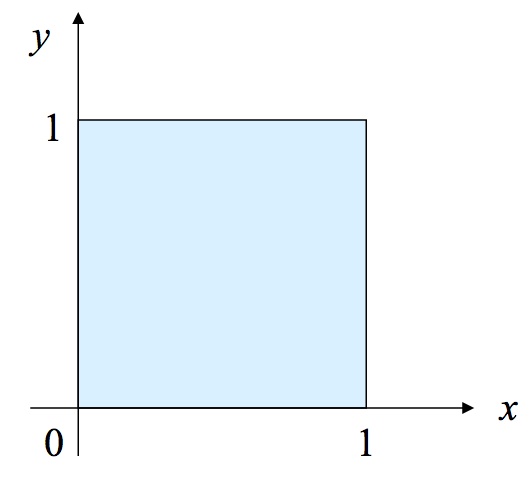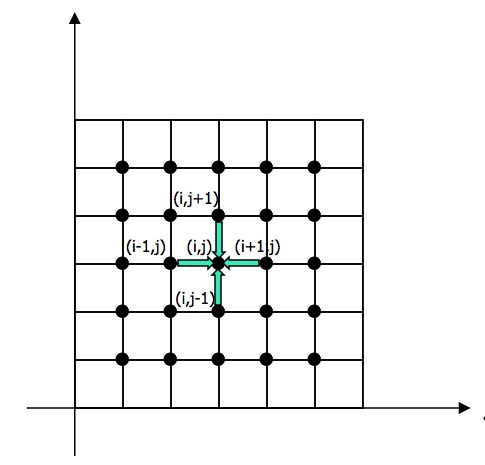- バックアップ一覧
- 差分 を表示
- 現在との差分 を表示
- ソース を表示
- 6.1 MPI並列計算の復習 へ行く。
- 1 (2010-07-08 (木) 11:31:58)
- 2 (2010-07-08 (木) 12:13:00)
神戸大学 大学院システム情報学研究科 計算科学専攻 陰山 聡
この演習で示すソースコードは /tmp/100708 に置いた。
【2010.07.08: 講義後追記】 変更箇所
- スクリプトでgnuplotを使う場合、グラフがグラフが一瞬描かれた直後に終了してしまうという問題があった。これを避けるにはgnuplotスクリプトの最後の一行に
pause -1
と書く必要がある。 以下のコンテンツではこの点に修正を加えた。 - ソースコードheat1_animation_x_prof.f90が抜けていた問題を修正した。
【目次】
前回のレポート(並列化)の解説 †
問題設定の復習 †
- 2次元正方形領域 [0,1]×[0,1] での熱伝導を考える
- 境界をすべて0℃に固定
- 領域全体に一定の熱を加える
- ⇒ このとき,十分な時間が経った後での温度分布はどうなるか?
非並列版コードの復習 †
熱伝導とは注目する一点が、「近所」の温度と等しくなろうという傾向である。 ⇒周囲の温度の平均値になろうとする。 熱源があれば、一定の割合で温度が上がろうとする。
ヤコビ法アルゴリズム。
do j=1, m
do i=1, m
u_new(i,j) = ( u(i-1,j) + u(i+1,j) + u(i,j-1) + u(i,j+1) ) / 4 + f(i,j)
end do
end do
このヤコビ法に基づいたコード heat1.f90を前回の演習で学んだ。
heat1_wi_comments.f90 (詳細コメント付きバージョン) †
後の改訂に備えて、まずこのheat1.f90を少し丁寧に復習しよう。
!
! heat1_wi_comments.f90
!
!-----------------------------------------------------------------------
! Time development form of the thermal diffusion equation is
! \partial T(x,y,t) / \partial t = \nabla^2 T(x,y,t) + heat_source.
! In the stationary state,
! \nabla^2 T(x,y) + heat_source = 0.
! The finite difference method with grid spacings dx and dy leads to
! (T(i+1,j)-2*T(i,j)+T(i-1,j))/dx^2
! + (T(i,j+1)-2*T(i,j)+T(i,j-1))/dy^2 + heat_source = 0.
! When dx=dy=h,
! T(i,j) = (T(i+1,j)+T(i-1,j)+T(i,j+1)+T(i,j-1))/4+heat_source*h^2/4.
! This suggests a relaxation method called Jacobi method adopted in
! this code.
!-----------------------------------------------------------------------
program heat1_wi_comments
implicit none
integer, parameter :: m=31 ! mesh size
integer :: nmax=20000 ! max loop counter
integer :: i,j,n
integer, parameter :: SP = kind(1.0)
integer, parameter :: DP = selected_real_kind(2*precision(1.0_SP))
real(DP), dimension(:,:), allocatable :: u ! temperature field
real(DP), dimension(:,:), allocatable :: un ! work array
real(DP) :: heat=1.0_DP ! heat source term; uniform distribution.
real(DP) :: h ! grid size
! |<----- 1.0 ----->|
! j=m+1+-------u=0-------+ ---
! j=m | | ^
! . | | |
! . | uiform | |
! u=0 heat u=0 1.0
! j-direction . | source | |
!(y-direction) j=2 | | |
! ^ j=1 | | v
! | j=0 +-------u=0-------+ ---
! | i=0 1 2 ... i=m+1
! |
! +-------> i-direction (x-direction)
!
! when m = 7,
! |<-------------------- 1.0 -------------------->|
! | |
! | h h h h h h h h |
! |<--->|<--->|<--->|<--->|<--->|<--->|<--->|<--->|
! +-----+-----+-----+-----+-----+-----+-----+-----+
! i=0 1 2 3 4 5 6 7 8
!
allocate( u(0:m+1,0:m+1) ) ! memory allocation of 2-D array.
! you can access each element of u
! as u(i,j), where 0<=i<=m+1
! and 0<=j<=m+1.
allocate( un(m,m) ) ! another memory allocation. in
! this case un(i,j) with
! 1<=i<=m and 1<=j<=m.
h = 1.0_DP/(m+1) ! grid spacing.
u(:,:) = 0.0_DP ! initial temperature is zero all over the square.
do n = 1 , nmax ! relaxation loop
do j = 1 , m ! in the y-direction
do i = 1 , m
un(i,j)=(u(i-1,j)+u(i+1,j)+u(i,j-1)+u(i,j+1))/4.0_DP+heat*h*h
end do
end do ! same as the following do-loops:
u(1:m,1:m) = un(1:m,1:m) ! do j = 1 , m
! do i = 1 , m
! u(i,j) = un(i,j)
! end do
! end do
if ( mod(n,100)==0 ) print *, n, u(m/2+1,m/2+1) ! temperature at
end do ! the center
end program heat1_wi_comments
再びheat1.f90(コメントなしバージョン) †
次に詳しいコメントをはずしてもう一度もとのheat1.f90を見てみる。 (ただし、先週のコードから本質的でないところを少しだけ修正している。)
program heat1
implicit none
integer, parameter :: m=31, nmax=20000
integer :: i,j,n
integer, parameter :: SP = kind(1.0)
integer, parameter :: DP = selected_real_kind(2*precision(1.0_SP))
real(DP), dimension(:,:), allocatable :: u, un
real(DP) :: h, heat=1.0_DP
allocate(u(0:m+1,0:m+1))
allocate(un(m,m))
h=1.0_DP/(m+1)
u(:,:) = 0.0_DP
do n=1, nmax
do j=1, m
do i=1, m
un(i,j)=(u(i-1,j)+u(i+1,j)+u(i,j-1)+u(i,j+1))/4.0_DP+heat*h*h
end do
end do
u(1:m,1:m)=un(1:m,1:m)
if (mod(n,100)==0) print *, n, u(m/2+1,m/2+1)
end do
end program heat1
先週の課題(演習3-3) †
- heat1.f90 を MPI を用いて並列化せよ
解答例(heat2.f90) †
program heat2
use mpi
implicit none
integer, parameter :: m=31, nmax=20000
integer :: i,j,jstart,jend,n
integer, parameter :: SP = kind(1.0)
integer, parameter :: DP = selected_real_kind(2*precision(1.0_SP))
real(DP), dimension(:,:), allocatable :: u, un
real(DP) :: h, heat=1.0_DP
integer :: nprocs,myrank,ierr,left,right
integer, dimension(MPI_STATUS_SIZE) :: istat
call mpi_init(ierr)
call mpi_comm_size(MPI_COMM_WORLD,nprocs,ierr)
call mpi_comm_rank(MPI_COMM_WORLD,myrank,ierr)
h = 1.0_DP/(m+1)
jstart = m*myrank/nprocs+1
jend = m*(myrank+1)/nprocs
allocate( u(0:m+1,jstart-1:jend+1))
allocate(un( m, jstart:jend ))
u(:,:) = 0.0_DP
left = myrank-1
if ( myrank==0 ) left = nprocs-1
right = myrank+1
if ( myrank==nprocs-1 ) right = 0
do n=1, nmax
call mpi_sendrecv(u(1,jend),m,MPI_DOUBLE_PRECISION,right,100, &
u(1,jstart-1),m,MPI_DOUBLE_PRECISION,left,100, &
MPI_COMM_WORLD,istat,ierr)
call mpi_sendrecv(u(1,jstart),m,MPI_DOUBLE_PRECISION,left,100, &
u(1,jend+1),m,MPI_DOUBLE_PRECISION,right,100, &
MPI_COMM_WORLD,istat,ierr)
if (myrank==0) u(1:m, 0) = 0.0_DP
if (myrank==nprocs-1) u(1:m,m+1) = 0.0_DP
do j = jstart , jend
do i = 1 , m
un(i,j)=(u(i-1,j)+u(i+1,j)+u(i,j-1)+u(i,j+1))/4.0_DP+heat*h*h
end do
end do
u(1:m,jstart:jend)=un(1:m,jstart:jend)
if (jstart<=m/2+1 .and. jend>=m/2+1) then
if (mod(n,100)==0) print *, n, u(m/2+1,m/2+1)
end if
end do
call mpi_finalize(ierr)
end program heat2
コード解説 (コメント付きソースコード heat2_wi_comments.f90) †
上のheat2.f90を解説するために詳しいコメントをつけたソースコードheat2_wi_comments.f90を以下に示す。
program heat2_wi_comments
use mpi
implicit none
integer, parameter :: m=31 ! mesh size
integer, parameter :: nmax=20000 ! max loop counter
integer :: i,j,jstart,jend,n
integer, parameter :: SP = kind(1.0)
integer, parameter :: DP = selected_real_kind(2*precision(1.0_SP))
real(DP), dimension(:,:), allocatable :: u ! temperature field
real(DP), dimension(:,:), allocatable :: un ! work array
real(DP) :: heat=1.0_DP ! heat source term. uniform distribution.
real(DP) :: h ! grid spacing; dx=dy=h
integer :: nprocs ! number of MPI processes
integer :: myrank ! my rank number
integer :: left, right ! nearest neighbor processes
integer, dimension(MPI_STATUS_SIZE) :: istat ! used for MPI
integer :: ierr ! used for mpi routines
call mpi_init(ierr)
call mpi_comm_size(MPI_COMM_WORLD,nprocs,ierr)
call mpi_comm_rank(MPI_COMM_WORLD,myrank,ierr)
h = 1.0_DP/(m+1) ! grid spacings. see the comment fig below.
jstart = m*myrank/nprocs+1 ! the process is in charge of this point
jend = m*(myrank+1)/nprocs ! point to this point. see the fig below.
!- - - - - - - - - - - - - - - - - - - - - - - - - - - - - - - -
!
! when m = 7, nprocs = 3
!
! |<-------------------- 1.0 -------------------->|
! | |
! | h | h h h h h h h |
! |<--->|<--->|<--->|<--->|<--->|<--->|<--->|<--->|
! | | | | | | | | |
! +-----+-----+-----+-----+-----+-----+-----+-----+
! j=0 1 2 3 4 5 6 7 8
! +-----+-----+-----+-----+-----+-----+-----+-----+
! | jstart | | | | | |
! | | jend | | jstart | |
! o-----rank=0------o | | jend |
! | | | | | |
! | jstart jend | | |
! | | | | | |
! o------- rank=1---------o | |
! | | | |
! o------rank=2-----o
!
!- - - - - - - - - - - - - - - - - - - - - - - - - - - - - - - -
!
! Another example, when m=17, nprocs=6
!
! j=0 1 2 3 4 5 6 7 8 9 10 11 12 13 14 15 16 17 18
! +--+--+--+--+--+--+--+--+--+--+--+--+--+--+--+--+--+--+
! | | | | | | |
! o==rank0=o | o===rank3===o | |
! | | | | | |
! o===rank1===o | o===rank4===o |
! | | | |
! o===rank2===o o===rank5===o
! each process | |
! has 2D array u[i,jstart-1:jend+1]
!
!- - - - - - - - - - - - - - - - - - - - - - - - - - - - - - - -
allocate( u(0:m+1,jstart-1:jend+1)) ! 2-D array for temperature.
allocate(un(m,jstart:jend)) ! 2-D work array.
u(:,:) = 0.0_DP
left = myrank-1 ! left neighbor.
if (myrank==0) left = nprocs-1 ! a dummy periodic distribution
right = myrank+1 ! right neighbor. ! for code simplicity. this has
if (myrank==nprocs-1) right = 0 ! actually no effect.
do n = 1 , nmax ! main loop for the relaxation, to equilibrium.
!- - - - - - - - - - - - - - - - - - - - - - - - - - - - - - - - -
!
! jend jstart
! <(left)> | | <(right)>
! - --o--o--o--o--o o--o--o--o--o-- -
! send | ^ recv ^ |
! | | | |
! [2] [3] [1] [4]
! | | | |
! recv v | send | v
! o--o--o--o-- - - --o--o--o--o--o
! | |
! jstart jend
! <(myself)>
!
!- - - - - - - - - - - - - - - - - - - - - - - - - - - - - - - - -
call mpi_sendrecv(u(1,jend), m,MPI_DOUBLE_PRECISION,right,100, & ! [1]
u(1,jstart-1),m,MPI_DOUBLE_PRECISION,left,100, & ! [2]
MPI_COMM_WORLD,istat,ierr)
call mpi_sendrecv(u(1,jstart),m,MPI_DOUBLE_PRECISION,left, 100, & ! [3]
u(1,jend+1),m,MPI_DOUBLE_PRECISION,right,100, & ! [4]
MPI_COMM_WORLD,istat,ierr)
if (myrank==0) u(1:m,0 ) = 0.0_DP ! to keep the boundary
if (myrank==nprocs-1) u(1:m,m+1) = 0.0_DP ! condition (temp=0).
do j = jstart , jend ! Jacobi method.
do i = 1 , m ! no need to calculate the boundary i=0 and m+1.
un(i,j)=(u(i-1,j)+u(i+1,j)+u(i,j-1)+u(i,j+1))/4.0_DP+heat*h*h
end do
end do
u(1:m,jstart:jend)=un(1:m,jstart:jend) ! this is actually doubled do-loops.
if (jstart<=m/2+1 .and. jend>=m/2+1) then ! print out the temperature
if (mod(n,100)==0) print *, n, u(m/2+1,m/2+1) ! at the central grid point.
end if
end do
deallocate(un,u) ! or you can call deallocate for two times for un and u.
call mpi_finalize(ierr)
end program heat2_wi_comments
MPI通信の確認 †
前回の演習で説明されたMPI_SENDRECVの挙動を改めて確認しよう。 そのためのソースコード(heat2_sendrecv_check.f90)を以下に用意した。 これは上記のheat2.f90からヤコビ法による熱伝導問題の解法部分を除き、 MPIの通信に関係する部分だけを抜き出したものである。
!- - - - - - - - - - - - - - - - - - - - - - - - - - - - - - - -
!
! when m = 7, nprocs = 3
!
! |<-------------------- 1.0 -------------------->|
! | |
! | h | h h h h h h h |
! |<--->|<--->|<--->|<--->|<--->|<--->|<--->|<--->|
! | | | | | | | | |
! +-----+-----+-----+-----+-----+-----+-----+-----+
! j=0 1 2 3 4 5 6 7 8
! +-----+-----+-----+-----+-----+-----+-----+-----+
! | jstart | | | | | |
! | | jend | | jstart | |
! o==== rank=0 =====o | | jend |
! | | | | | |
! | jstart jend | | |
! | | | | | |
! o======= rank=1 ========o | |
! | | | |
! o===== rank=2 ====o
!
!- - - - - - - - - - - - - - - - - - - - - - - - - - - - - - - -
!
! Another example, when m=17, nprocs=6
!
! j=0 1 2 3 4 5 6 7 8 9 10 11 12 13 14 15 16 17 18
! +--+--+--+--+--+--+--+--+--+--+--+--+--+--+--+--+--+--+
! | | | | | | |
! o==rank0=o | o===rank3===o | |
! | | | | | |
! o===rank1===o | o===rank4===o |
! | | | |
! o===rank2===o o===rank5===o
! each process | |
! has 2D array u[i,jstart-1:jend+1]
!
!- - - - - - - - - - - - - - - - - - - - - - - - - - - - - - - -
!
program heat2_sendrecv_check
use mpi
implicit none
integer, parameter :: m=17
integer :: i,j,jstart,jend,n
integer, parameter :: SP = kind(1.0)
integer, parameter :: DP = selected_real_kind(2*precision(1.0_SP))
real(DP), dimension(:,:), allocatable :: u, un
integer :: nprocs,myrank,ierr,left,right
integer, dimension(MPI_STATUS_SIZE) :: istat
call mpi_init(ierr)
call mpi_comm_size(MPI_COMM_WORLD,nprocs,ierr)
call mpi_comm_rank(MPI_COMM_WORLD,myrank,ierr)
jstart = m*myrank/nprocs+1
jend = m*(myrank+1)/nprocs
allocate( u(0:m+1,jstart-1:jend+1))
allocate(un( m, jstart:jend ))
u(:,jstart-1:jend+1) = myrank
call print('before',myrank, jstart, jend, u(m/2+1,:))
left = myrank-1
if ( myrank==0 ) left = nprocs-1
right = myrank+1
if ( myrank==nprocs-1 ) right = 0
!- - - - - - - - - - - - - - - - - - - - - - - - - - - - - - - - -
!
! jend jstart
! <(left)> | | <(right)>
! - --o--o--o--o--o o--o--o--o--o-- -
! send | ^ recv ^ |
! | | | |
! [2] [3] [1] [4]
! | | | |
! | | | |
! recv v | send | v
! o--o--o--o-- - - --o--o--o--o--o
! | |
! jstart jend
! <(myself)>
!
!- - - - - - - - - - - - - - - - - - - - - - - - - - - - - - - - -
call mpi_sendrecv(u(1,jend), m,MPI_DOUBLE_PRECISION,right,100, & ! [1]
u(1,jstart-1),m,MPI_DOUBLE_PRECISION, left,100, & ! [2]
MPI_COMM_WORLD,istat,ierr)
call mpi_sendrecv(u(1,jstart),m,MPI_DOUBLE_PRECISION, left,100, & ! [3]
u(1,jend+1),m,MPI_DOUBLE_PRECISION,right,100, & ! [4]
MPI_COMM_WORLD,istat,ierr)
! if (myrank==0) u(1:m, 0) = 0.0_DP
! if (myrank==nprocs-1) u(1:m,m+1) = 0.0_DP
call print(' after', myrank, jstart, jend, u(m/2+1,:))
deallocate(u,un)
call mpi_finalize(ierr)
contains
subroutine print(message,myrank,jstart,jend,u)
character(len=*), intent(in) :: message
integer, intent(in) :: myrank
integer, intent(in) :: jstart
integer, intent(in) :: jend
real(DP), dimension(jstart-1:jend+1), intent(in) :: u
integer, dimension(0:m+1) :: iu ! work array of integer
integer :: rank, ierr
character(len=100) :: line ! printed line on stdout
character(len=20) :: format ! print format
iu(:) = -1 ! initialization of the work integer array.
iu(jstart-1:jend+1) = u(jstart-1:jend+1) ! copy the data (double to int).
write(format,'(i3"(i3)")') m+2 ! format string generator.
write(line,format) (iu(i),i=0,m+1) ! integers to a text line.
do rank = 0 , nprocs-1 ! to avoid random printing
call mpi_barrier(MPI_COMM_WORLD,ierr) ! by each process in random order,
if ( rank==myrank ) then ! we here put the loop and barrier.
print *, message//':'//trim(line)
end if
end do
end subroutine print
end program heat2_sendrecv_check
ジョブスクリプト †
このコード(heat2_sendrecv_check.f90)をscalarに投入するためのジョブスクリプトを 以下のように設定すると、heat2_sendrecv_check.f90のコメントに書いた例と同じ、 プロセス数が6のジョブを投入できる。
#PBS -l cputim_job=00:05:00
#PBS -l memsz_job=2gb
#PBS -l cpunum_job=1
#PBS -T vltmpi
#PBS -b 6
#PBS -q PCL-A
cd /home/users/yourID/YourDirectory
mpirun_rsh -np 6 ${NQSII_MPIOPTS} ./a.out
【演習】 †
heat2_sendrecv_check.f90をmpif90コマンドでコンパイルし、 上記ジョブスクリプトを heat2_sendrecv_check.jsという名前のファイルに保存した上で、
qsub heat2_sendrecv_check.js
としてジョブを投入せよ。
(2) MPIプロセス数やグリッドサイズmを変えて試せ。
結果例 †
%NQSII(INFO): ------- Output from job:0000 ------- [0] before: 0 0 0 0 -1 -1 -1 -1 -1 -1 -1 -1 -1 -1 -1 -1 -1 -1 -1 [0] after: 5 0 0 1 -1 -1 -1 -1 -1 -1 -1 -1 -1 -1 -1 -1 -1 -1 -1 %NQSII(INFO): ------- Output from job:0001 ------- [1] before: -1 -1 1 1 1 1 1 -1 -1 -1 -1 -1 -1 -1 -1 -1 -1 -1 -1 [1] after: -1 -1 0 1 1 1 2 -1 -1 -1 -1 -1 -1 -1 -1 -1 -1 -1 -1 %NQSII(INFO): ------- Output from job:0002 ------- [2] before: -1 -1 -1 -1 -1 2 2 2 2 2 -1 -1 -1 -1 -1 -1 -1 -1 -1 [2] after: -1 -1 -1 -1 -1 1 2 2 2 3 -1 -1 -1 -1 -1 -1 -1 -1 -1 %NQSII(INFO): ------- Output from job:0003 ------- [3] before: -1 -1 -1 -1 -1 -1 -1 -1 3 3 3 3 3 -1 -1 -1 -1 -1 -1 [3] after: -1 -1 -1 -1 -1 -1 -1 -1 2 3 3 3 4 -1 -1 -1 -1 -1 -1 %NQSII(INFO): ------- Output from job:0004 ------- [4] before: -1 -1 -1 -1 -1 -1 -1 -1 -1 -1 -1 4 4 4 4 4 -1 -1 -1 [4] after: -1 -1 -1 -1 -1 -1 -1 -1 -1 -1 -1 3 4 4 4 5 -1 -1 -1 %NQSII(INFO): ------- Output from job:0005 ------- [5] before: -1 -1 -1 -1 -1 -1 -1 -1 -1 -1 -1 -1 -1 -1 5 5 5 5 5 [5] after: -1 -1 -1 -1 -1 -1 -1 -1 -1 -1 -1 -1 -1 -1 4 5 5 5 0
as of 2025-07-06 (日) 12:10:47 (4904)


